Conference Held in Korea
Sharing, Connecting and Overcoming
Conference Held in Korea on the Current Situation in Fukushima
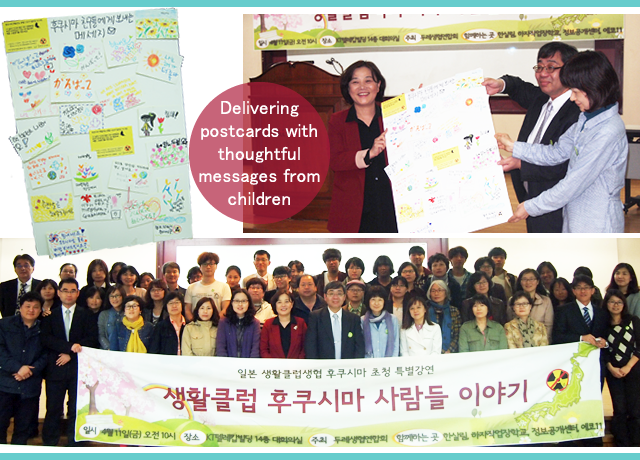
In the refreshment tour during the summer of 2013, nine families from the Seikatsu Club (SC) Fukushima were warmly welcomed by members and staff of Dure Consumers’ Co-operative Union (DCCU). The tour led to another chance to spread the word in Korea about the current situation of Fukushima three years after the nuclear disaster at Fukushima Daiichi. From April 9th to 12th, a total of five people from SC Fukushima and the Seikatsu Club Consumers' Co-operative Union (SCCCU) visited Korea. (Posted on May 16th)
Ms. Hiromi Otsuyama, chairperson of the board of directors of SC Fukushima, sent a message to the tour in which she said that the last refreshment tour to Korea reminded her of the fact that people in Korea really care about Fukushima even though they live a long way away. “That is a source of energy for us leading our lives here in Fukushima,” she continued. “I would be very happy if people in Korea could learn more about the situation in Fukushima, and our mutual understanding and interaction could be strengthened.”
Ms. Mayumi Niizeki (member of SC Fukushima), Mr. Yuji Tsuchiyama (Executive Director, SC Fukushima) and three staff members of SCCCU including Managing Director Mr. Takayuki Watanabe visited Korea while keeping in mind the sentiments of Ms. Otsuyama’s message.
Dialogues with Civil Society Organizations
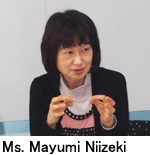 On April 10th, the group lost no time in taking up opportunities to have dialogues with people from civil society organizations including consumers' co-operatives, alternative schools, and an Information Disclosure Center in the morning of the day after their arrival.
On April 10th, the group lost no time in taking up opportunities to have dialogues with people from civil society organizations including consumers' co-operatives, alternative schools, and an Information Disclosure Center in the morning of the day after their arrival.
Mr. Tsuchiyama gave a presentation entitled "Government Surveillance of Radioactive Effects on Human Health and Activities of the Civil Society Organizations’ Network." He talked about how they had pressed the Fukushima Prefecture government to improve the Fukushima Health Management Survey. Following the presentation, Mr. Watanabe talked about SCCCU’s thyroid gland testing activity.
The Korean participants expressed their concern over the concealment of information, which is similar to Japan in the case of nuclear accidents in Korea. "If a local government intentionally fails to take minutes at meetings, the information will not be disclosed,” Mr. Tsuchiyama said. “Sometimes the reason why information is not made public is allegedly due to the protection of privacy."
Ms. Niigaki told the participants how she worked with other volunteers to launch the "Network to Protect Children from Radiation" in November 2011. She talked about her experiences with the Network, such as their decontamination work along the routes to and from school, negotiations with the local government to take measures against places with high radiation levels, and so on.

Presentation on SC’s Activities at a Meeting with Korean Co-operatives
After lunch, the delegation had a meeting with around 20 people from member co-operatives of DCCU. Many of them had participated in the 2013 refreshment tour. They expressed concern over the children in Fukushima who visited Korea for the tour, and asked how they are.
As everyone at the meeting was a member of a consumer's co-operative, the main topic of the meeting was SC's activities. Mr. Watanabe talked about how SC addresses radiation problems and how producers are compensated for losses when their products do not meet SCCCU's voluntary standard on radiation levels, which is much stricter than the government standard. Ms. Watanabe made a presentation about the current situation of SCCCU's activities for abandoning nuclear power generation.
One of the members of Southern Gyeonggi Dure Consumers' Co-operative (a sister co-operative of SC Chiba) asked what kind of activities SC does for children's health. Answering the question, the example of the "Vegetable Package for Children in Fukushima" was presented. Vegetables go through a ten-hour radiation detection process and the radiation level must be below the measurable limit of 10Bq/kg.
In response to a question about measures to help people evacuate from areas with high radiation levels, Mr. Tsuchiyama said, "The government is trying to persuade people to go back to their hometowns rather than respect their right to evacuate. People who are exposed to an annual total of more than 1mSv of radiation have to be ensured the option of evacuation. Japan's ‘nuclear village,’ however, plays down the effects of radiation on human health and even promotes nuclear power generation at a global level. I hope we can work together to abandon nuclear power."

Conference Attended by 100 People from Consumers' Co-operatives and Civil Society Organizations
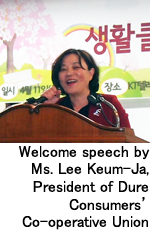 The following day, April 11th, a “Special Meeting―Lectures by SC Fukushima” was organized by DCCU, and around 100 people from consumers’ co-operatives and civil society organizations participated.
The following day, April 11th, a “Special Meeting―Lectures by SC Fukushima” was organized by DCCU, and around 100 people from consumers’ co-operatives and civil society organizations participated.
In opening the meeting, messages written on postcards by Korean children during an anti-nuclear event in March were delivered from Ms. Lee Keum-Ja, President of Dure Consumers’ Co-operative Union, to Ms. Niizeki and Mr. Tsuchiyama.
Ms. Mayumi Niizeki then made a speech entitled “Voices from Fukushima—Protecting our heath, daily lives, and future of our children.” “Environmentally friendly and self-sufficient lifestyles which depended on home-grown organic rice and vegetables, firewood from the hills behind our houses, groundwater for drinking, and so on, were totally destroyed by the nuclear accident in Fukushima,” Ms. Niizeki said. The audience listened to her seriously when she talked about her experience of a freedom-of-information request for the results of the Fukushima Health Management Survey.
“I am determined to do everything I can to protect our children’s lives and have a bright future. SC gives me the greatest support and wisdom to protect our health.” Participants gave her a heartwarming round of applause.

Sending a Message of “Connecting and Overcoming”
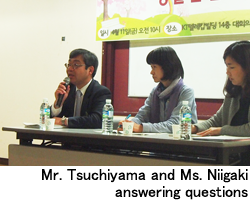 In a speech entitled “Connecting and Overcoming,” Mr. Tsuchiyama, talked about the activities of SC Fukushima after the Great East Japan Earthquake in 2011, including the confirmation of the safety of SC members while delivering goods, in the “Blue Sky” open markets supporting survivors who live in temporary houses, and during radioactivity measurements and thyroid gland tests. He explained that SC takes measures against radiation based on the precautionary principle, the people’s right of self-determination, the protection of the children of Fukushima and their right to know.
In a speech entitled “Connecting and Overcoming,” Mr. Tsuchiyama, talked about the activities of SC Fukushima after the Great East Japan Earthquake in 2011, including the confirmation of the safety of SC members while delivering goods, in the “Blue Sky” open markets supporting survivors who live in temporary houses, and during radioactivity measurements and thyroid gland tests. He explained that SC takes measures against radiation based on the precautionary principle, the people’s right of self-determination, the protection of the children of Fukushima and their right to know.
A participant asked about the attitude of members of the Seikatsu Club toward food producers in Fukushima. Mr. Tsuchiyama answered the question by giving an example of tofu developed by SC Fukushima. It is produced from a variety of soybeans which absorbs less radioactive substances and members decided to continue their collective purchase of the product.
Some participants said that the title of “Connecting and Overcoming” was impressive. “On the night of the accident at Fukushima Daiichi, I put this title on my article in a newsletter to our members hoping that SC members around Japan would connect with members in Fukushima to overcome this difficult situation,” Mr. Tsuchiyama recalls. “It is important to keep on raising our voices about nuclear power plants,” he added.
Working Together for a Society without Nuclear Power Plants
During the visit to Korea, members and staff of SC had a serious dialog with Korean people about SC’s measures against radiation and activities to abandon nuclear energy. Korean people were very frank about asking questions on subjects that interest them. They shared not only the “frightfulness” of radiation but also other feelings of people in Fukushima who are struggling and trying to overcome their difficulties by working together.
Ms. Niiseki who visited Korea for the first time said, “It was encouraging for me to meet Korean people from consumers’ co-operatives and civil society organizations who are sincerely concerned about food safety, the environment, and the issue of nuclear power plants. I really appreciate these valuable encounters.” Nuclear power plants and radioactive pollution are problems without borders. We will keep on working with Korean people to think about our lifestyle and build a society without nuclear power plants.
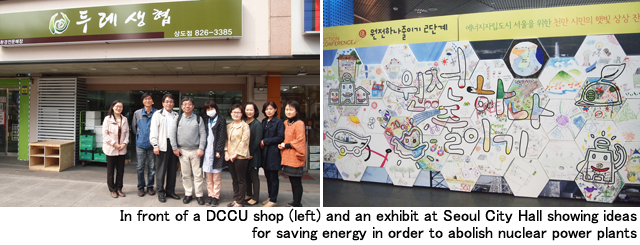
生活クラブをはじめませんか?
42万人が選ぶ安心食材の宅配生協です
ウェブ加入限定 無料プレゼント






